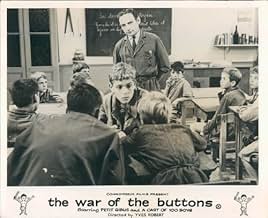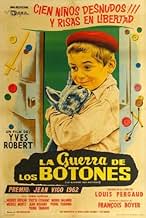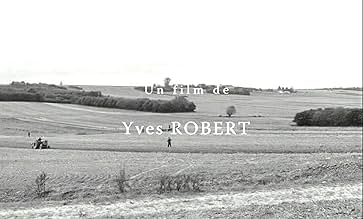IMDb-BEWERTUNG
7,4/10
2940
IHRE BEWERTUNG
Füge eine Handlung in deiner Sprache hinzuThe school boys of two villages in France are fighting. Their trophy are the buttons they will snatch from the enemy. This fight will bring those kids to everlasting friendship...eventually.The school boys of two villages in France are fighting. Their trophy are the buttons they will snatch from the enemy. This fight will bring those kids to everlasting friendship...eventually.The school boys of two villages in France are fighting. Their trophy are the buttons they will snatch from the enemy. This fight will bring those kids to everlasting friendship...eventually.
- Regie
- Drehbuch
- Hauptbesetzung
- Auszeichnungen
- 1 Gewinn & 1 Nominierung insgesamt
Gérard Aubry
- Un enfant de la bande à Lebrac
- (Nicht genannt)
François Bazinsky
- Un enfant de la bande à Lebrac
- (Nicht genannt)
Christophe Bourseiller
- Gaston
- (Nicht genannt)
François Boyer
- The priest
- (Nicht genannt)
Empfohlene Bewertungen
10elfqueen
The war of the buttons is one of those films that warms the cockles even at a tender age (where such nostalgic sentimentality like cocklewarming is not even a concept yet). The artful description of human nature at its early stages, the heartache of being young, the struggle of empowering onself and of feeling powerless in a world dominated by grown-up violence and/or indifference is so tender, so enchanting that it should be compulsory on school curricula, at least for students of French. Seeing this film makes me yearn for the French countryside, it makes me laugh, it makes me happy, it makes me want to be child and to have a child of my own. And it also moves me to tears, and makes me remember the agonies of childhood. In short, this film is true art in the old philosophical sense: it produces emotion, true emotion, it depicts beauty and it involves its audience in thorough katharsis. A gem.
"La guerre des boutons" is based on the same title book by Louis Pergaud, which was published in 1912 - 3 years before its author was killed in action from friendly fire during World War I.
The book and its story, although it can be considered lighthearted and humorous, it is a dark manifestation about the stupidity and the futility of war.
Watching this film, almost 30 years after I firstly read the book (on a Boy Scout summer camp), I remembered not only the joyfulness and the innocence of my own childhood but also themes, points and conflicts from the book, that I couldn't fully perceive them as a child while I was reading it, such as leadership, friendship, camaraderie, tolerance, belonging versus violence, abuse, hating, bullying.
This 1962 film was a nostalgic trip to those years and a fine adaptation of the book.
The book and its story, although it can be considered lighthearted and humorous, it is a dark manifestation about the stupidity and the futility of war.
Watching this film, almost 30 years after I firstly read the book (on a Boy Scout summer camp), I remembered not only the joyfulness and the innocence of my own childhood but also themes, points and conflicts from the book, that I couldn't fully perceive them as a child while I was reading it, such as leadership, friendship, camaraderie, tolerance, belonging versus violence, abuse, hating, bullying.
This 1962 film was a nostalgic trip to those years and a fine adaptation of the book.
I don't even recall how old I was when I saw this movie. Probably 7 or 8 years old. The thing is, I never forgot having seen it there, with a bunch of other kids from the orphanage where I was growing up. And I never forgot that I had one of the best times going to the theater and watching it. But a lot of the story was fuzzy in my memory, as I am 47 at the time of this writing. And watching it again last week made me aware of how much there was that I didn't get at the time... the gravity of what the children had done, repeating the silly behaviors of adult, but with a child's perception of the world. Yes, it is funny, and charming, a close up to children's world, with its naive, fresh outlook, its joys and sorrows. Very enjoyable!!!
Rural France fascinates the French, and to those in the main cities like Paris, Marseille and Lyon it is regarded as that ' other place ' where people behave very differently. Crudely put they are either simpletons or people of the earth representing the true nature of life. This film tends towards the former attitude but it is a somewhat ' gentle ' attack against stupidity and vulgarity by concentrating on the children of two villages who go to ' war ' against each other. They of course represent the grown-ups around them who are often either drunk or slightly violent in their approach to each other. It is fun to watch as both sides take ' prisoners ' and ' torture ' them by tearing off all the bottons on their clothes, and so we have in one scene the laughable situation of a battle scene in the nude. As the children imitate their elders by using swear words they barely understand this all appears vaguely shocking, especially to the West Germans who cut it, and the prudish English giving it an ' X ' certificate. That just shows how two countries can be as backward as the two opposing village children. As for the film itself it is well filmed and the director Yves Robert speeds the whole absurdity along with zest. Personally I got a bit bored with the relentless and overbearing music, and the sheer noise of the whole thing, and a feeling of monotony ( the enemy of all cinema ) set in. No spoilers but the ending is rather moving and the last line of the film painfully relevant to the ( partial ) side the film is on. It also errs on the side of sentimentality which grated on me, especially concerning one of the smaller children, but taking all things into consideration it is an oddity worth seeing.
Yves Robert died a few days back and I write this comment as a tribute to him:"la guerre des boutons" is a timeless brats movie,which can be watched forty years after with the same pleasure:a blockbuster when it was released in France in 1961,French kids enjoy it at least as much as their parents or grandparents today.
Of course,Louis Pergaud's Rabelaisian novel,written at the beginning of last century, was watered down (but not cheapened),or else it would not have been accepted by the censorship:there are lines in this book that would make blush the well-meanings.The words are crude and not prudish at all.The story was much more than a funny joke though:actually,the children aped the grown-ups and THEIR wars:("to think,that later,we will be as stupid as'em!"-this is the last line of the movie).
Yves Robert transposed the action to the rural sixties.He gathered lots and lots of children whom he directed masterfully."Magna cum laude",first class honours,for young "Petit Gibus"!anyone who watches the movie will love him:he's so funny when he gets drunk!Shot in black and white,the movie will remind you of your schooldays.
Louis Pergaud died in 1915.The war he was waging was not a war of the buttons.
Of course,Louis Pergaud's Rabelaisian novel,written at the beginning of last century, was watered down (but not cheapened),or else it would not have been accepted by the censorship:there are lines in this book that would make blush the well-meanings.The words are crude and not prudish at all.The story was much more than a funny joke though:actually,the children aped the grown-ups and THEIR wars:("to think,that later,we will be as stupid as'em!"-this is the last line of the movie).
Yves Robert transposed the action to the rural sixties.He gathered lots and lots of children whom he directed masterfully."Magna cum laude",first class honours,for young "Petit Gibus"!anyone who watches the movie will love him:he's so funny when he gets drunk!Shot in black and white,the movie will remind you of your schooldays.
Louis Pergaud died in 1915.The war he was waging was not a war of the buttons.
Wusstest du schon
- WissenswertesNone of the child actors in this movie are listed in the credits.
- Alternative VersionenWest German re-release (1984) was cut by ca. 6 minutes to secure a "Not under 6" rating. This re-release version was used for all subsequent home video releases. The uncut version was released as a bonus feature on the 2005 DVD release (with the missing scenes in French with German subtitles, despite the fact that the complete film was dubbed in 1962).
- VerbindungenReferenced in Les échos du cinéma: Folge #1.32 (1961)
Top-Auswahl
Melde dich zum Bewerten an und greife auf die Watchlist für personalisierte Empfehlungen zu.
- How long is War of the Buttons?Powered by Alexa
Details
- Erscheinungsdatum
- Herkunftsland
- Sprache
- Auch bekannt als
- War of the Buttons
- Drehorte
- Armenonville, Bailleau-Armenonville, Eure-et-Loir, Frankreich(Longeverne town: main street and school)
- Produktionsfirma
- Weitere beteiligte Unternehmen bei IMDbPro anzeigen
- Laufzeit1 Stunde 30 Minuten
- Farbe
- Sound-Mix
- Seitenverhältnis
- 1.66 : 1
Zu dieser Seite beitragen
Bearbeitung vorschlagen oder fehlenden Inhalt hinzufügen

Oberste Lücke
By what name was Der Krieg der Knöpfe (1962) officially released in India in English?
Antwort




























